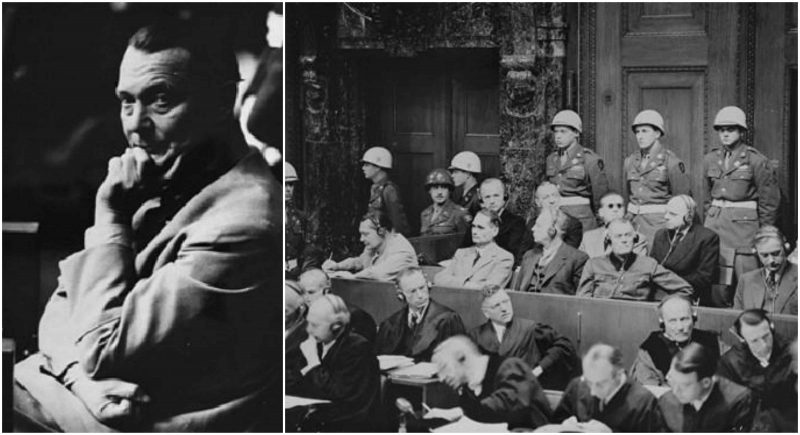The International Military Tribunal was opened on November 19, 1945, in the Palace of Justice in Nuremberg. The first session was presided over by the Soviet judge, Nikitchenko.
The prosecution entered indictments against 24 major war criminals and seven organizations – the leadership of the Nazi party, the Reich Cabinet, the Schutzstaffel (SS), Sicherheitsdienst (SD), the Gestapo, the Sturmabteilung (SA) and the “General Staff and High Command”, comprising several categories of senior military officers. These organizations were to be declared “criminal” if found guilty.
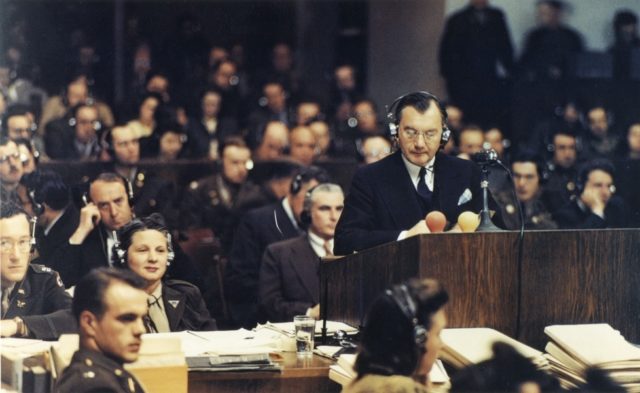
The indictments were for:
- Participation in a common plan or conspiracy for the accomplishment of a crime against peace
- Planning, initiating and waging wars of aggression and other crimes against peace
- War crimes
- Crimes against humanity
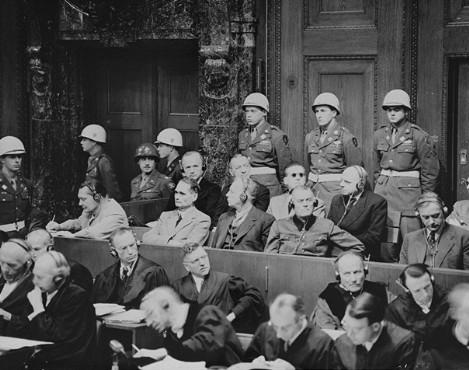
The 24 accused were, with respect to each charge, either indicted but not convicted, indicted and found guilty, or not charged. The Rorschach test was administered to the defendants, along with the Thematic Apperception Test and a German adaptation of the Wechsler-Bellevue Intelligence Test. All were above average intelligence, several considerably. Here some of the ‘considerably’ intelligent Nazis:
Karl Dönitz – IQ 138
Doenitz was a German admiral who would eventually command entire navy. He was chosen by Hitler to succeed him as Fuhrer. He was convicted of carrying out unrestricted submarine warfare in breach of the 1936 Second London Naval Treaty. Doenitz negotiated surrender following Hitler’s suicide. He was released 1 October 1956 and died 24 December 1980.
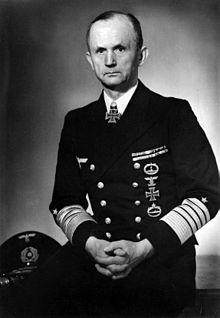
“Politicians brought the Nazis to power and started the war. They are the ones who brought about these disgusting crimes, and now we have to sit there in the dock with them and share the blame!” (5/27/46) – Karl Donitz at the Nuremberg trials.
Hermann Göring – IQ 138
Goering was a Commander of the Luftwaffe from 1935 to 45; Chief of the 4-Year Plan from, and original head of the Gestapo before turning it over to the SS in April 1934. Originally the second-highest-ranked member of the Nazi Party and Hitler’s designated successor, he fell out of favor with Hitler in April 1945. Highest ranking Nazi official to be tried at Nuremberg but committed suicide the night before his execution.
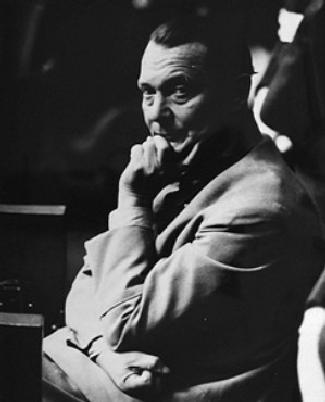
“I joined the Party precisely because it was revolutionary, not because of the ideological stuff.” (12/11/45)….”The whole conspiracy idea is cockeyed. We had orders to obey the head of state. We weren’t a band of criminals meeting in the woods in the dead of night to plan mass murders…The four real conspirators are missing: The Fuhrer, Himmler, Bormann, and Goebbels.” (1/5/46)…”This is a political trial by the victors and it will be a good thing when Germany realizes that…” (6/13/46) – Herman Goering at the Nuremberg trials
Franz von Papen – IQ 134
von Papen was a Chancellor of Germany in 1932 and Vice-Chancellor under Hitler in 1933–34. He was also an ambassador to Austria from 1934 to 38 and ambassador to Turkey from 1939 to 44. Although acquitted at Nuremberg, von Papen was reclassified as a war criminal in 1947 by a German de-Nazification court, and sentenced to eight years’ hard labor. He was acquitted following an appeal after serving two years. Franz von Papen died in Obersasbach, West Germany, on 2 May 1969 at the age of 89.
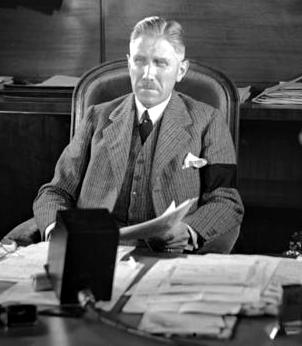
“I think [Hitler] wanted the best for Germany at the beginning, but he became an unreasoning evil force with the flattery of his followers–Himmler, Goering, Ribbentrop, etc…I tried to persuade him he was wrong in his anti-Jewish policies many a time. He seemed to listen at first, but later on, I had no influence on him.” (10/30/45) – Franz von Papen at the Nuremberg trials.
Hjalmar Schacht – IQ 143
Schacht was a prominent banker and economist. He was a pre-war president of the Reichsbank 1923–30 & 1933–38 and Minister of Economics from 1934 to 1937; and admitted to violating the Treaty of Versailles. Many at Nuremberg alleged that the British had brought about Schacht’s acquittal to safeguard German industrialists and financiers; Francis Biddle revealed Geoffrey Lawrence had argued that Schacht, being a “man of character”, was nothing like the other “ruffians” on trial. By 1944, he had been imprisoned in a concentration camp by the Nazis and was outraged to be put on trial as a major war criminal.
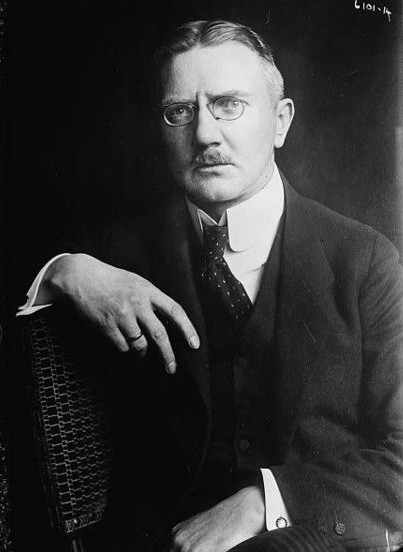
“I have full confidence in the judges, and I am not afraid of the outcome. A few of the defendants are not guilty; most of them are sheer criminals.” (10/23/45)…”All I wanted was to build up Germany industrially….The only thing they can accuse me of is breaking the Versailles Treaty.” (11/1/45) – Hjalmar Schacht at the Nuremberg trials.
Arthur Seyss-Inquart – IQ 141
Seyss-Inquart was an Austrian Nazi politician who served as Chancellor of Austria for two days – from 11 to 13 March 1938 – before the Anschluss annexation of Austria by Nazi Germany, signing the constitutional law as acting head of state upon the resignation of President Wilhelm Miklas. During World War II, he served the Third Reich in the General Government of Poland and as Reichskommissar in the Netherlands. At the Nuremberg trials, he was found guilty of crimes against humanity and sentenced to death. He was hanged on 16 October 1946.
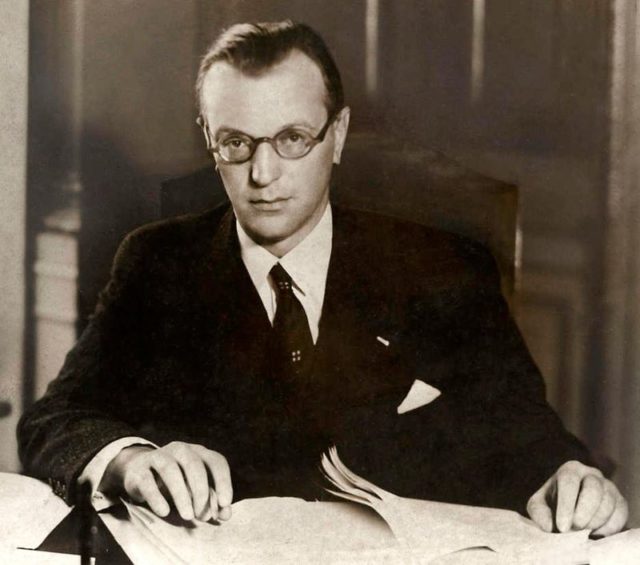
“The southern German has the imagination and emotionality to subscribe to a fanatic ideology, but he is ordinarily inhibited from excesses by his natural humaneness. The Prussian does not have the imagination to conceive in terms of abstract racial and political theories, but when he is told to do something, he does it.” (4/46) – Arthur Seyss-Inquart at the Nuremberg trials.
